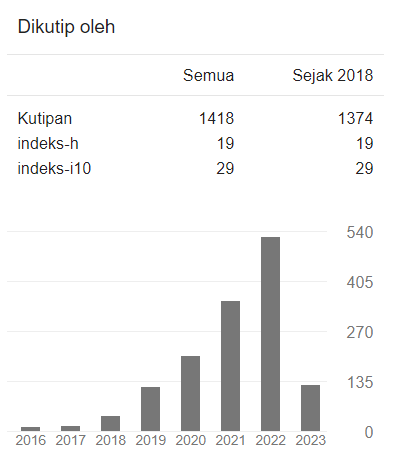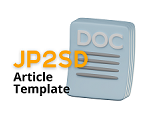Keterampilan Pengelolaan Kelas Mahasiswa PGSD Pada Praktik Mengajar di Sekolah Dasar
DOI:
https://doi.org/10.22219/jp2sd.v10i2.22926Abstract
Class management skills are one of the primary teaching skills that are important to be mastered by prospective teacher students. Therefore, before students enter the field, they must ensure their ability to manage the class. The learning process will be conducive if the teacher manages the class well enough to support the learning process. The purpose of this study was to take a deeper look at the ability to manage student-teacher classes. This study uses a qualitative research method with a descriptive approach. With the research stages (1) Preparation Stage, in the preparation stage, the researcher prepares a research plan and makes interview, observation, and documentation guidelines. (2) Implementation phase, researchers conduct field studies by carrying out observations and interviews, as well as taking documentation with (3) Findings Researchers analyze findings and draw conclusions from research results and continue with the last stage, namely (4) Research Reporting Stage using the method in collecting data by observation, interviews, and documentation. This study's results indicate that prospective teacher students' ability to manage the class is excellent. Each indicator in managing the class is carried out according to the student's experience demonstrating basic teaching skills. Researchers hope for future researchers to look more deeply into prospective teacher students' ability to master other basic teaching skills in more detail and innovatively.
Downloads
References
Achdiani, Y., & Rusliyani, A. (2017). Pengetahuan Keterampilan Dasar Mengajar dalam Menyiapkan Guru Sekolah Menengah Kejuruan. Teknobuga, 5(2), 34–43.
Amrin, S. (2021). Analisis Keterampilan Mengajar Mahasiswa Pendidikan Ekonomi Universitas Flores. Edukatif : Jurnal Ilmu Pendidikan, 3(1), 58–65. https://doi.org/10.31004/edukatif.v3i1.233
Anggraini, S. (2019). Analisis Dampak Pemberian Reward And Punishment Bagi Siswa SD Negeri Kaliwiru Semarang. Jurnal Mimbar PGSD Undiksha, 7(3), 221–229. https://ejournal.undiksha.ac.id/index.php/JJPGSD/article/download/19393/11464
Annisa, C. (2021). Analisis Keterampilan Mengelola Kelas Pada Pembelajaran Micro Mahasiswa Pgsd Semester Vi. Jurnal Dharma PGSD, 1(2), 86–93.
Asmawati, M. (2020). 1. Pengaruh Pemberian Reward Dan Punishment Terhadap Motivasi Belajar Siswa Pada Muatan Ppkn Kelas Iv Sdn Pemepek Kecamatan Pringgarata Tahun Ajaran 2020/2021. Jurnal Inovasi Peneliian, 1(7), 1289–1296.
Blyznyuk, T. (2019). Formation of Teachers’ Digital Competence: Domestic Challenges and Foreign Experience. Journal of Vasyl Stefanyk Precarpathian National University, 5(1), 40–46. https://doi.org/10.15330/jpnu.5.1.40-46
Damanik, R., Sagala, R. ., & Rezeki, T. . (2019). Keterampilan Dasar Mengajar Guru. In Universitas Negeri Yogyakarta.
Febianti, Y. N. (2018). Jurnal Edunomic Vol. 6, No. 2, Tahun 2018 93. Jurnal Edunomic, 6(2), 93–102. https://core.ac.uk/download/pdf/229997374.pdf
Hakim, L., Sinaga, P., & Setiawan, A. (2018). Tanggap Guru terhadap Penggunaan Elearning dalam Pembelajaran Fisika. Jurnal Dosen Universitas PGRI Palembang, 8. https://jurnal.univpgri-palembang.ac.id/index.php/prosiding/article/view/1543/1348
Hendriana, E. C. (2018). Pengaruh Keterampilan Guru dalam Mengelola Kelas terhadap Hasil Belajar Peserta Didik di Sekolah Dasar. JPDI (Jurnal Pendidikan Dasar Indonesia), 3(2), 46. https://doi.org/10.26737/jpdi.v3i2.780
IFRIANTI, S. (2018). Membangun Kompetensi Pedagogik Dan Keterampilan Dasar Mengajar Bagi Mahasiswa Melalui Lesson Study. Terampil : Jurnal Pendidikan Dan Pembelajaran Dasar, 5(1), 1. https://doi.org/10.24042/terampil.v5i1.2748
Irawati, H. (2020). Analisis Keterampilan Dasar Mengajar Mahasiswa Calon Guru Biologi Di Pendidikan Biologi Fkip Uad. INKUIRI: Jurnal Pendidikan IPA, 9(1), 34. https://doi.org/10.20961/inkuiri.v9i1.41378
Isnanto, I., Pomalingo, S., & Harun, M. N. (2020). Strategi Pengelolaan Kelas Di Sekolah Dasar. Jurnal Pendidikan Glasser, 4(1), 7. https://doi.org/10.32529/glasser.v4i1.392
Jaya, H. N. (2017). Keterampilan Dasar Guru untuk Menciptakan Suasana Belajar yang Menyenangkan. Didaktis: Pendidikan Dan Ilmu Pengetahuan, 17(1), 23–35. http://journal.um-surabaya.ac.id/index.php/didaktis/article/view/1555/1275
Jumrawarsi, J., & Suhaili, N. (2021). Peran Seorang Guru Dalam Menciptakan Lingkungan Belajar Yang Kondusif. Ensiklopedia Education Review, 2(3), 50–54. https://doi.org/10.33559/eer.v2i3.628
Jundi, M., & Yasin, Z. (2020). Penilaian Sejawat dalam Pembelajaran Keterampilan Dasar Mengajar bagi Mahasiswa Pendidikan Bahasa Arab pada Mata Kuliah Pembelajaran Mikro. Maharat: Jurnal Pendidikan Bahasa Arab, 2(2), 51–70. https://doi.org/10.18196/mht.2217
Kelas, M. P. (2018). 80-256-1-Pb. 2(1), 294–310.
Kirom, A. (2017). Peran Guru Dan Peserta Didik Dalam Proses Pembelajaran. Al Murabbi, 3(1), 69–80. http://jurnal.yudharta.ac.id/v2/index.php/pai/article/view/893
Kristiana, D., & Muhibbin, A. (2019). Keterampilan Dasar Mengajar Dalam Pembelajaranmatematika di SMP. Manajemen Pendidikan, 13(2), 204–209. https://doi.org/10.23917/jmp.v13i2.7488
Naibaho, D. (2018). Peranan guru sebagai fasilitator dalam perkembangan peserta didik. Jurnal Christian Humaniora, 2(1), 77–86.
Nasution, K. (2016). Kepemimpinan Guru Dalam Meningkatkan Efektivitas Pembelajaran Pai. Jurnal Darul ’Ilmi, 04(01), 116–128.
Nur, H. M., & Fatonah, N. (2022). Paradigma Kompetensi Guru. Jurnal PGSD UNIGA, 1(1), 12–16.
Nurhalisah, N. (2010). Peranan Guru Dalam Pengelolaan Kelas. Lentera Pendidikan : Jurnal Ilmu Tarbiyah Dan Keguruan, 13(2), 192–210. https://doi.org/10.24252/lp.2010v13n2a6
Pamela, I. S., Chan, F., Yantoro, Fauzia, V., Susanti, E. P., Frimals, A., & Rahmat, O. (2019). Penerapan. Jurnal Pendidikan Dasar, 3(2), 23–30.
Puspitaningrum, E. (2017). Kemampuan Guru Dalam Pengelolaan Kelas Di Sd Negeri Minomartani 2 the Ability of Teachers in Classroom Management At Sd Negeri Minomartani 2. Basic Education, 6(1), 28–39. http://journal.student.uny.ac.id/ojs/ojs/index.php/pgsd/article/view/6604
Rahayu, M. M. (2014). Journal of Elementary Education. Peningkatan Hasil Belajar Menulis Puisi Bebas Melalui Metode Suggestopedia, 3(November), 14–20. http://journal.unnes.ac.id/sju/index.php/jee
Rina Dwi Muliani, R. D. M., & Arusman, A. (2022). Faktor - Faktor yang Mempengaruhi Minat Belajar Peserta Didik. Jurnal Riset Dan Pengabdian Masyarakat, 2(2), 133–139. https://doi.org/10.22373/jrpm.v2i2.1684
Rustaman, N. Y. (2017). MEWUJUDKAN SISTEM PEMBELAJARAN SAINS / BIOLOGI BERORIENTASI PENGEMBANGAN LITERASI PESERTA DIDIK Rustaman , Mewujudkan Sistem Pembelajaran Rustaman , Mewujudkan Sistem Pembelajaran KS-2. April, 1–8.
Saputra, R. A., Hariyadi, A., & Sarjono. (2021). Pengaruh Konsep Diri dan Reward Terhadap Prestasi Belajar Siswa Pada Mata Pelajaran Pendidikan Kewirausahaan. Jurnal Educatio FKIP …, 7(3), 1046–1053. https://doi.org/10.31949/educatio.v7i3.1337
Sumar, W. T. (2020). Pengelolaan Kelas dalam Meningkatkan Motivasi Belajar siswa memberikan pendidikan dan pengajaran baik secara formal maupun non formal ( Aziz ,. Educational Management, 1(4), 51–52.
Surjana, A. (2004). Efektivitas Pengelolaan Kelas. Jurnal Pendidikan Penabur, 3(02), 68–81.
Sutisnawati, A. (2017). Analisis Keterampilan Dasar Mengajar Mahasiswa Calon Guru Sekolah Dasar. Jurnal MPD, 8(1), 15–24.
Tantu, Y. R. P., & Christi, L. Y. (2020). Analisis Pelaksanaan Microteaching Mahasiswa PGSD Pada Mata Kuliah PSAP Sains dan Teknologi. Jurnal Basicedu, 4(3), 707–715. https://doi.org/10.31004/basicedu.v4i3.424
Tune Sumar, W. (2020). Pengelolaan Kelas dalam Meningkatkan Motivasi Belajar Siswa. Jambura Journal of Educational Management, 49–59. https://doi.org/10.37411/jjem.v1i1.105
Wahyuni, R. (2016). Pembelajaran Kooperatif Bukan Pembelajaran. 3(1), 37–43.
Winarni, S. (2014). Pengaruh Perhatian Guru, Motivasi Belajar, dan Kecerdasan Emosional terhadap Prestasi Belajar Biologi Siswa SMA Negeri 2 Bantul. Jurnal Bioedukatika, 2(1), 42. https://doi.org/10.26555/bioedukatika.v2i1.4111
Downloads
Published
Issue
Section
License
Copyright (c) 2022 Jurnal Pemikiran dan Pengembangan Sekolah Dasar (JP2SD)

This work is licensed under a Creative Commons Attribution-ShareAlike 4.0 International License.
Authors who publish with Jurnal Pemikiran dan Pengembangan Sekolah Dasar (JP2SD) agree to the following terms:
- For all articles published in Jurnal Pemikiran dan Pengembangan Sekolah Dasar (JP2SD), copyright is retained by the authors. Authors give permission to the publisher to announce the work with conditions. When the manuscript is accepted for publication, the authors agree to automatic transfer of the publishing right to the publisher.
- Authors retain copyright and grant the journal right of first publication with the work simultaneously licensed under a Creative Commons Attribution-ShareAlike 4.0 International License that allows others to share the work with an acknowledgment of the work's authorship and initial publication in this journal.
- Authors are able to enter into separate, additional contractual arrangements for the non-exclusive distribution of the journal's published version of the work (e.g., post it to an institutional repository or publish it in a book), with an acknowledgment of its initial publication in this journal.
- Authors are permitted and encouraged to post their work online (e.g., in institutional repositories or on their website) prior to and during the submission process, as it can lead to productive exchanges, as well as earlier and greater citation of published work (See The Effect of Open Access).

This work is licensed under a Creative Commons Attribution-ShareAlike 4.0 International License.


















